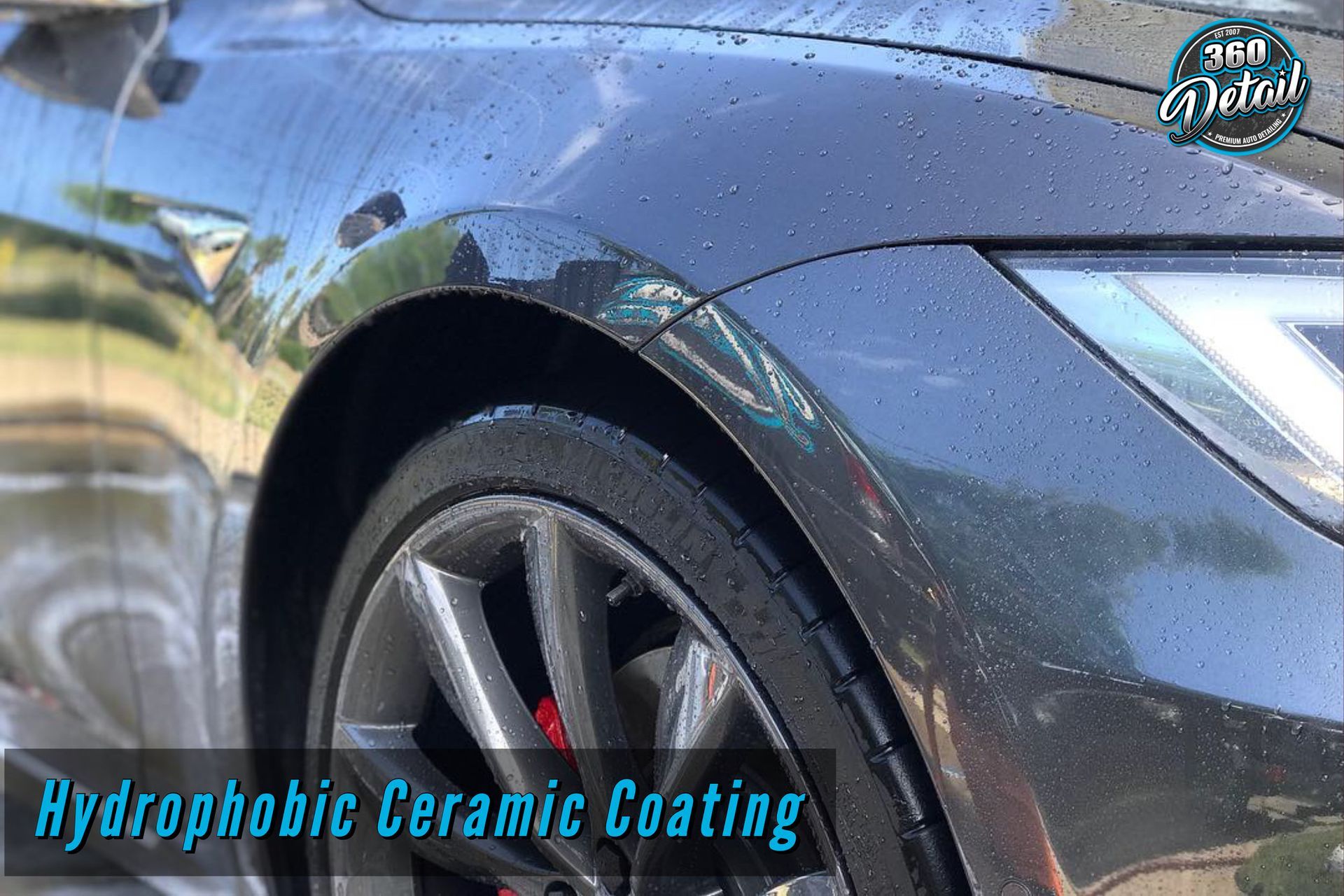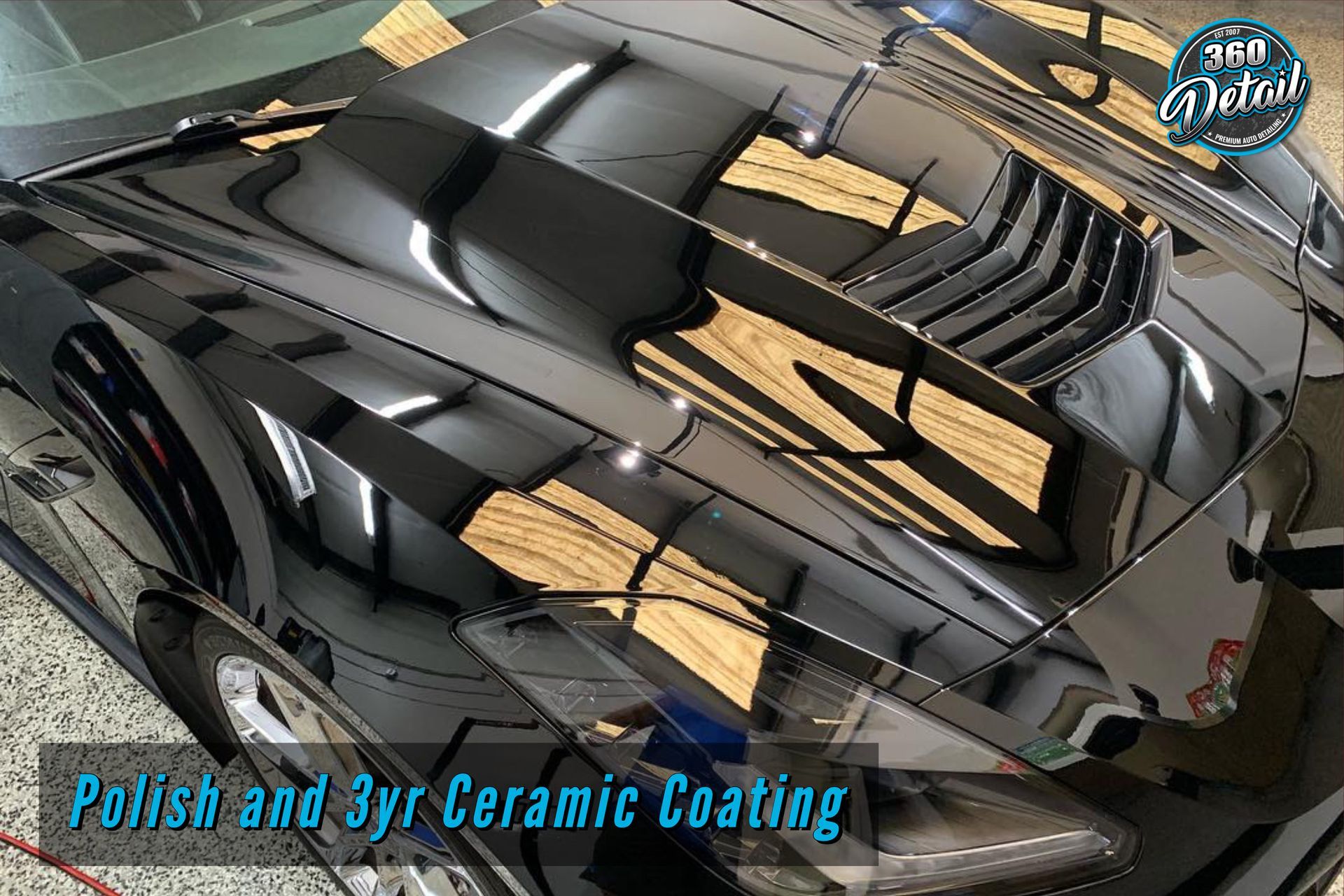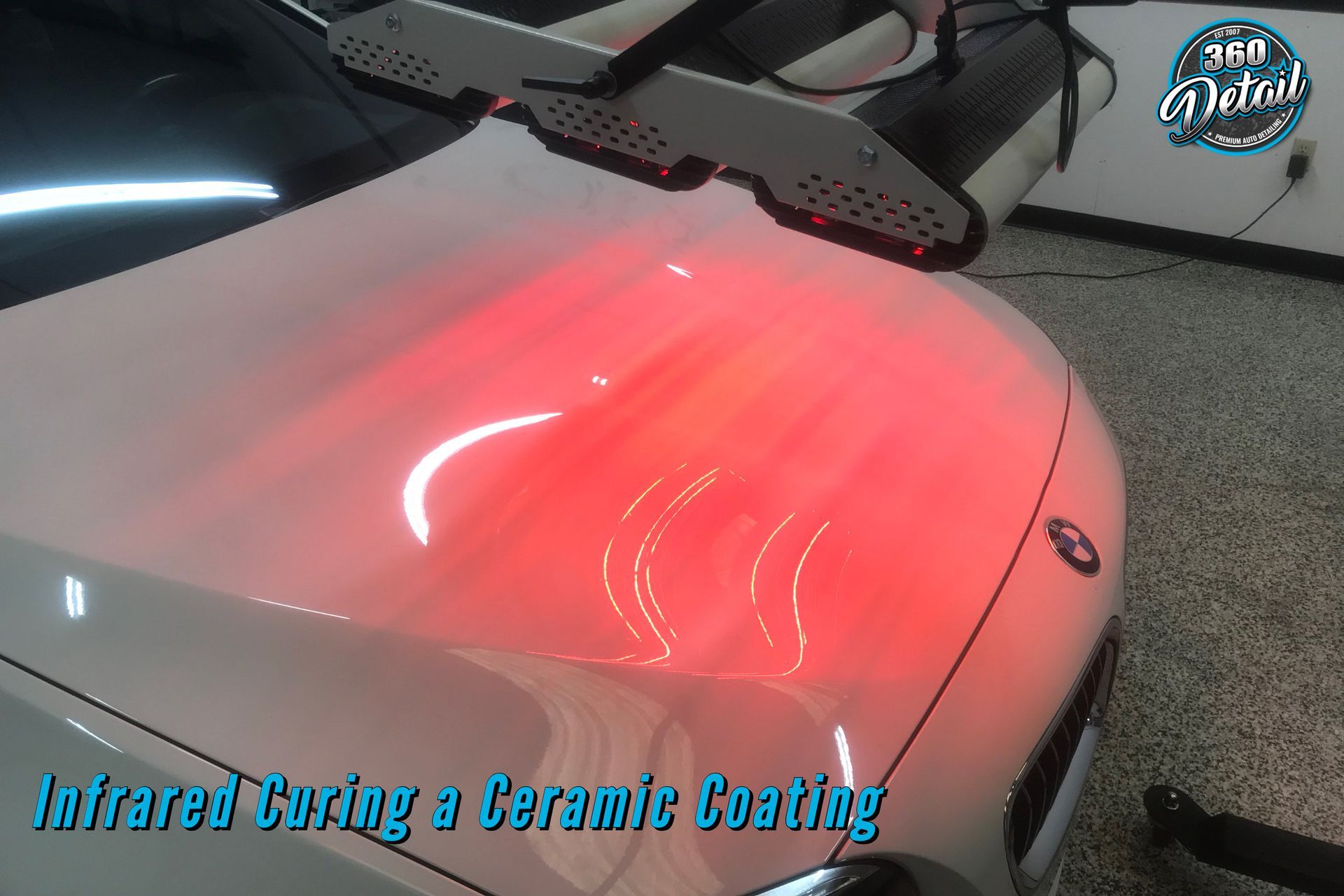What is a ceramic coating?
Ceramic coatings are all the rage in the car care world. I want to start by explaining what it is, more importantly what it is not, and give you as much information to make an educated decision and avoid the hype, the traps and the lies that are out there.

Ceramic coatings, also called “nano coatings” are essentially Silicon dioxide, (Si02) also known as silica. A main ingredient in quartz or sand. Glass is primarily made of silica which is why sometimes you’ll hear coatings referred to as glass coatings. These nano particles are suspended in a solvent. When properly applied to your vehicles paint, they form a solid bond to the outer layer of your clear coat. Under a microscope you’d see your paint looks more like a mountain range than a smooth even surface. Coatings fill in the outer layer of your paint and harden. This creates an even smoother surface. A smooth surface is going to shed water much better and retain a higher gloss.
Hardness
This extra layer is often times harder than factory paint. This is where you’ll hear 9H come into play. Mohs hardness, is a measure of resistance a smooth surface has to scratching or abrasion. The hardness of a professional grade ceramic coating often exceeds the hardness of factory paint. Does that offer scratch resistance? Sure. If you’re using a toothbrush you may see scratches in paint that you won’t see in a ceramic coating. The daily driver isn’t being attacked toothbrushes. If you are using a dirty wash mitt with large dirt particles and are rubbing it all over your coating you are eventually going to scratch the coating. If you drive past a bush, get keyed or a rock flys up while driving you are going to damage your finish. Pro Tip #1: The hardness scale really doesn’t apply to coatings in a manner that is going to be useful to you, the consumer. Dont get caught up in hardness claims and especially any claims of being scratch resistant (beyond light scratches) or even scratch proof. If anyone is trying to sell you on scratch resistance, or shows you a video of a lighter making marks on a coating, keep looking. This is marketing hype and a lame trick. Again, your car isn’t under attack by lighters and toothbrushes. Its being attacked by objects several times harder.
Chemical resistance
Here is a benefit that coatings have over traditional waxes and sealants. Clear coats vary in hardness and density depending on the manufacturer of your vehicle. In general they don’t fair well to bug etching, bird droppings, sap or other chemical contact. Ceramic coatings offer excellent protection from love bugs, bird droppings and other common hazards. Does that mean you can leave it on your paint for extended periods? No. You should still remove these contaminants as soon as you can. But I have seen over the years of applying and maintaining coated vehicles that it does offer good protection and often times saves your paint from ruin. This is something a wax, sealant or any other spray on protection can not offer. Plus one for coatings in this department. When I detail a vehicle with these contaminants I often have to use special chemicals to safely remove them. More times than not, they come off with the initial steps of the wash on a coated vehicle.

gloss
As I mentioned above, coatings fill in the outer layer of a clear coat. This creates a smooth surface. The smoother a surface is the glossier it becomes. There are waxes that give a high gloss to paint but wax alone is not what provides gloss. They paint must be clean, all contaminants removed either with a clay bar or chemicals, and the paint must be polished before applying the wax. A wax is merely a film that varies in durability that sits on top of your paint. The bond is weakened and broken with every wash and simply by being exposed to the elements. A coating bonds to the paint, levels out and can only be removed by abrading. The protection lasts longer and the gloss is outstanding. The smoothness of the surface makes contaminants release during the wash much easier. Water rolls right off carrying dirt along with it.
Maintenance.
“So I just got my car ceramic coated. That means I never have to wax it again right? I dont have to wash it as often? I can take it through a car wash now without damaging it right?” Maintenance is the make or break factor on a coated vehicle. I know there are guys out there that want to sell coatings to everyone but coatings aren’t for everyone. I ask every customer about their maintenance routine, where the vehicle is kept, how often it is cleaned etc. If I feel like you really don’t pay much attention to your vehicle until its bad, I will discourage you from a coating. It would be a waste of money. Coatings are for the car owner that want to keep their vehicle in pristine condition, but don’t want to spend HOURS each week or other week cleaning their car. The time spent cleaning and maintaining a coated car is much less than a non coated car. Basic wash principles and a few ceramic specific products are all it takes. You can expect LONG life out of your coating with regular, basic maintenance. If you’re not going to take at least monthly care of your vehicle Id suggest a premium synthetic wax over a coating. If someone is trying to convince you that neglecting a coating is ok, I’d move on.

Consumer Grade Vs Pro Grade
It seems everyone out there has a version of a ceramic coating. There are coatings that are only sold to trained professionals and coatings that are sold to consumers. The consumer grade coatings seem to boast the most absurd claims. When they fail to perform its easy to blame installer error. The ingredients in a professional grade coating are going to far exceed that of a consumer grade coating. When you have a the flu you can go to the pharmacy and get over the counter meds or a prescription. The over the counter meds may or may not help. The ingredients aren’t terribly life threatening. But if you want the GOOD stuff you need a script. It’s the same with coatings. So what’s the difference between professional grade coatings then? The person installing the coating makes FAR more difference in the end result than the brand. Yes there are variations in the brands, but most of those differences lie in the application process and ease of installation. Things that are only going to make a difference to the installer. Most ceramic coating companies are really just marketing companies. None of them have any tangible proof in who is the best. There are however a few brands that truly are innovators and have a product that far exceeds others. Some have created accreditation programs to insure professional installation. Some will sell to anyone with a detail business. But there are good Doctors and bad Doctors and they all have their degree. All ceramic coatings look fantastic on day 1. All of them. Coatings require proper prep and installation. This means time. There are several shortcuts that can be taken to get a car in and out. These shortcuts will be what shortens the end life of a coating. As a professional I will say installing a coating the RIGHT way is a major pain. This is partly why they are expensive. Those that are under cutting prices to get the job should be avoided. For a high grade coating, a shop or climate controlled facility is recommended. Humidity and moisture are large factors in the curing process. I use IR curing lamps and or keep the vehicle indoors overnight before releasing to the customer to insure a proper cure. There are those charging a ridiculous amount for a coating job. They are probably over selling the product. There are those making claims and low bidding the job. They are the ones taking short cuts. This level of detailing is a quality over quantity operation. Dont shop for a coating job on price. Buy cheap, buy twice.
Final words
Coatings really are an amazing upgrade in protection. Corrosion and chemical resistance as well as gloss and ease of maintenance make them worth it. They require upkeep, but minimal upkeep unlike an uncoated vehicle does. Before you get sucked into price, claims or brands, focus on the reputation of your installer. A true professional detailer should guide you based on your expectations and needs not on trying to sell you a product you don’t need or won’t maintain.
about us
KRWORKS is owned and operated by Kris Regina. With two decades of experience in Jacksonville, Florida, KRWORKS, brings you the best in ceramic coating and paint protection film (PPF) installation. Working directly with the installer through the entire process ensures your satisfaction. Quality is my top priority, and the results speak for themselves. No middlemen, no gimmicks, just pure vehicle enhancement and protection backed by years of detailing and film installation expertise. Choose KRWORKS as your trusted vehicle detailer for all your ceramic coating and PPF needs.
Quick Links
Serving jacksonville and surrounding areas
Contact Us
Phone: (904) 662-1616
Email: Kris@krworksfl.com
Hours of Operation
Monday-Friday: 8:00 AM - 5:00 PM
By Appointment Only
Saturday-Sunday: Closed
KRWORKS Designed by the team at Detailers Roadmap, a platform developed for detailing operators across the globe.
All Rights Reserved | 8bitcreative, LLC | KRWORKS

